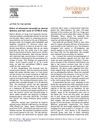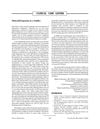 26 citations,
June 2020 in “Polymers”
26 citations,
June 2020 in “Polymers” Microneedle made of iron oxide and PVA helps hair regrowth in alopecia treatment.
 December 2023 in “International Journal of Advanced Research in Science, Communication and Technology”
December 2023 in “International Journal of Advanced Research in Science, Communication and Technology” Semecarpus anacardium Linn. is a plant with many health benefits, including reducing inflammation, fighting cancer, and stimulating hair growth.
 24 citations,
November 2019 in “Experimental Dermatology”
24 citations,
November 2019 in “Experimental Dermatology” PPAR-γ is important for healthy hair and its problems, and more research on PPAR-γ treatments is needed.
 23 citations,
October 2006 in “Journal of Dermatological Science”
23 citations,
October 2006 in “Journal of Dermatological Science” Ethosomal minoxidil improves hair growth by penetrating deeper into skin and shortening hair cycle.
 May 2024 in “FEBS open bio”
May 2024 in “FEBS open bio” Annurca apple extract may help treat hair loss and protect against oxidative stress.
 9 citations,
November 2013 in “Presse Medicale”
9 citations,
November 2013 in “Presse Medicale” The document concludes that managing female hyperandrogenism requires a combination of identifying the cause, lifestyle changes, medication, and cosmetic treatments.
 December 2021 in “Razrabotka i registraciâ lekarstvennyh sredstv”
December 2021 in “Razrabotka i registraciâ lekarstvennyh sredstv” The gel form of substance Y is the most effective for treating hair loss.
 8 citations,
July 2014 in “Hair transplant forum international”
8 citations,
July 2014 in “Hair transplant forum international” Bio-enhanced hair restoration, using methods like growth factors, stem cells, and ATP, results in better hair growth and density than traditional hair transplants.
 February 2024 in “PloS one”
February 2024 in “PloS one” Nutraceuticals that promote hair growth do not reduce tamoxifen's effectiveness in breast cancer treatment.
 April 2024 in “Bioactive materials”
April 2024 in “Bioactive materials” New microneedle treatment with growth factors and a hair loss drug shows better and faster hair growth results than current treatments.
 September 2023 in “JPRAS Open”
September 2023 in “JPRAS Open” Botulinum Toxin A may help with hair growth and has some side effects; more research is needed.

Kerascalp hair serum was found to be safe and effective in improving hair growth and strength in people with mild to moderate hair loss.
 February 2018 in “InTech eBooks”
February 2018 in “InTech eBooks” Diagnosing and treating PCOS is complex due to differing criteria and requires a team approach.
 August 2023 in “Journal of Cosmetic Dermatology”
August 2023 in “Journal of Cosmetic Dermatology” Exosomes from hair papilla cells and the Chinese medicine Liao Tuo Fang can potentially promote hair growth and could be used to develop hair growth drugs.
 11 citations,
August 2018 in “Facial Plastic Surgery Clinics of North America”
11 citations,
August 2018 in “Facial Plastic Surgery Clinics of North America” Adipose-derived stem cells show potential for skin rejuvenation and wound healing but require more research to overcome challenges and ensure safety.
 3 citations,
April 2022 in “Clinical, Cosmetic and Investigational Dermatology”
3 citations,
April 2022 in “Clinical, Cosmetic and Investigational Dermatology” Different methods, including stress management, healthy diet, supplements, and treatments like minoxidil, can help hair grow back after COVID-19 related hair loss.
 February 2024 in “Molecules/Molecules online/Molecules annual”
February 2024 in “Molecules/Molecules online/Molecules annual” NMN could potentially treat hair loss by reducing oxidative stress and improving cell health.
 7 citations,
December 2021 in “Pharmaceutics”
7 citations,
December 2021 in “Pharmaceutics” Natural products like plant extracts can help promote hair growth and could be used to treat hair loss.
 1 citations,
June 2019 in “Innovare journal of medical sciences”
1 citations,
June 2019 in “Innovare journal of medical sciences” Polycystic Ovary Syndrome (PCOS) is a hormonal disorder in women that can cause infertility and other health issues, and it may be improved by treatments that increase insulin sensitivity.
 6 citations,
October 2013 in “Plastic and Reconstructive Surgery – Global Open”
6 citations,
October 2013 in “Plastic and Reconstructive Surgery – Global Open” HSL treatment speeds up hair growth and reduces oxidative stress in hair follicles of ob/ob mice.
 May 2024 in “Indian journal of pharmacy and pharmacology”
May 2024 in “Indian journal of pharmacy and pharmacology” Luliconazole is more effective than ketoconazole at repairing damaged hair cuticles.
 47 citations,
October 2014 in “Expert Opinion on Emerging Drugs”
47 citations,
October 2014 in “Expert Opinion on Emerging Drugs” New alopecia treatments aim for better results and fewer side effects.
 1 citations,
December 2022 in “Indian pediatrics/Indian Pediatrics”
1 citations,
December 2022 in “Indian pediatrics/Indian Pediatrics” A toddler who accidentally swallowed hair growth medicine experienced serious heart-related side effects but recovered after hospital treatment.
 May 2024 in “Physiologia Plantarum”
May 2024 in “Physiologia Plantarum” Bacillus subtilis helps plants get more phosphorus and grow better roots.
 12 citations,
October 2017 in “Journal of Cosmetic Dermatology”
12 citations,
October 2017 in “Journal of Cosmetic Dermatology” Combining plasma rich in growth factors with hair transplant surgery may lead to faster recovery and better outcomes for hair loss treatment.
 1 citations,
July 2005 in “Drugs and the pharmaceutical sciences”
1 citations,
July 2005 in “Drugs and the pharmaceutical sciences” Targeting drugs to hair follicles can treat skin conditions, but reaching deep follicle areas is hard and needs more research.
 34 citations,
July 2010 in “Expert Opinion on Drug Delivery”
34 citations,
July 2010 in “Expert Opinion on Drug Delivery” The document concludes that there is no agreed-upon best method for measuring drug delivery within hair follicles and more research is needed to validate current techniques.

Using 5% minoxidil foam twice daily can help regrow hair, especially in younger men aged 20-30.
 92 citations,
January 1998 in “Dermatology”
92 citations,
January 1998 in “Dermatology” Ketoconazole shampoo improves hair growth and reduces oil similarly to minoxidil in male pattern hair loss.
 October 2023 in “Journal of Cosmetic Dermatology”
October 2023 in “Journal of Cosmetic Dermatology” Using both minoxidil and finasteride together is more effective for hair growth than using either one alone in men with hair loss.






























